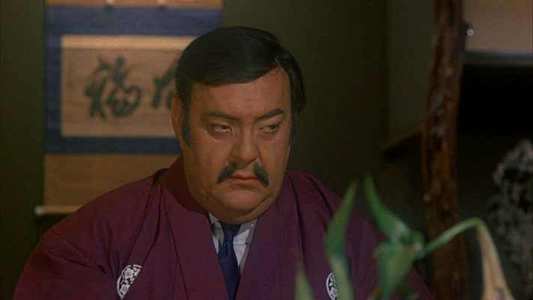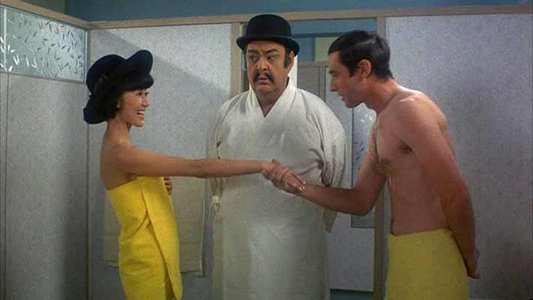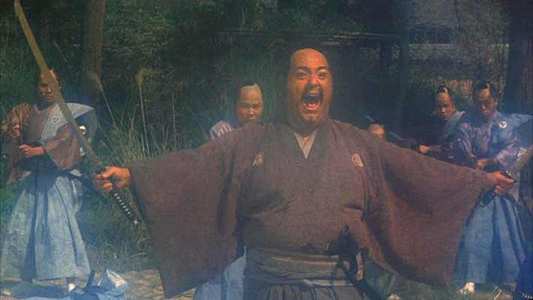Mastermind (UK)
Introduction
If there is one thing that gets my goat, it's 'blacking up', your respected Caucasian actor donning the old face paint to portray someone of another race. There has been the odd occasion where it has worked, but usually it's ill judged and borderline offensive. That's mostly down to the writing, with a lack of research compensated by a handful of clichés and ethnic stereotypes. The same thing holds true for foreign cinema, and I've seen horrendous examples of actors 'whitening up' to play Europeans. It used to be bad enough in the early days of cinema, when no one knew any better, and finding the right person to fill the role was more difficult. Today of course we live in a global village, and there is no excuse whatsoever. Mastermind takes its cue from the early Charlie Chan films, with Zero Mostel donning the oriental face paint to portray Japanese detective Hoku Ichihara. I was already constructing a mental purgatory for the disc when a couple of snippets of information caught my eye. First, it has a predominately Japanese cast, and second it was filmed on location in Kyoto. That not only gave Mastermind a reprieve in my mind, but it actually piqued my interest.
Inspector Hoku Ichihara is Kyoto's premiere sleuth, full of Eastern wisdom and devilishly intelligent. He also fancies himself as something of a latter day Samurai, with his insistence on meditation an excuse to indulge in a little daydreaming. With his British assistant Nigel Crouchback, he's called on to solve the most fiendish of crimes. His services are required when a murderous thief strikes at a toy factory, his target, a highly advanced miniature robot. The trail leads to former Nazis working for rival toy companies, the Israeli secret service, the American Intelligence agencies, and Ichihara's erstwhile girlfriend, Nikki Kono. Of course Ichihara cannot countenance Nikki's involvement in the crime, despite all the evidence against her.
Picture
Mastermind is released on Fremantle's budget label, which is usually an indication of a slap and dash approach to disc authoring. It certainly looks that way with a menu screen with only one option. However, the 1.85:1 anamorphic transfer is clear and sharp, although darker scenes are afflicted by grain. With the age of the film in mind, it's surprisingly free of print damage. Well, not so surprising when you learn that the film never enjoyed a theatrical release, and sat in the can gathering dust for seven years before it was even aired to the public. The opening credits take a lead from the Pink Panther movies, with an animated Ichihara detectoring his way through some traditional Ukio prints.
Sound
I heard no separation whatsoever, so I can only assume that this is a DD 2.0 mono track. It's perfectly adequate though, with the dialogue clear enough that you don't particularly lament the lack of subtitles.
Conclusion
With the initial impact of political incorrectness out of the way, Mastermind proves to be something of an affectionate spoof, with more than just lip service paid to the culture it is lampooning. With the Kyoto locations and Japanese cast, it certainly goes beyond simple stereotypes and clichés when it comes to depicting a foreign culture, and there is a fair level of detail in the background that does the story justice. Ichihara may be a Western caricature of a Japanese stereotype, but none of the characters around him are, which makes this more a gentle ribbing, and an opportunity to poke fun at our own ill-informed prejudices, instead of lampooning an entire culture. It's far less offensive than many so-called modern comedies. Yes, Borat, I point accusingly in your direction.
The trouble with Mastermind is that it isn't all that funny. It's certainly not a laugh a minute romp, more a chuckle every twenty minutes stroll. It's primary failing is that it is ploughing a well worn furrow, in that it apes The Pink Panther movies in more than just title sequence, and Zero Mostel tries to do for Japan, what Peter Sellers did with far more charisma, wit, style and charm for France. Even the subplot of the delectable Nikki continuously implicated in the crime, and Ichihara refusing to accept the idea is cribbed mercilessly from A Shot In The Dark. I was half expecting Ichihara to refer to Crouchback as 'my little Gaijin friend' before attacking him with the noble art of fisticuffs. It's the same dynamic of cultural pomposity continuously being punctured by ones own failings, which typifies Ichihara, although what marks his character out is his occasional lapse into whimsy as he imagines himself as a mediaeval Samurai.
Mastermind is a film that merely runs on idle; it feels like it is more interested in getting to the end credits than in making the comedy sparkle. I got the occasional smirk from it, and seeing Sorrell Booke a.k.a. Boss Hogg in a film did make me nostalgic for my childhood. Mastermind is a film that is much better than it could have been, but nowhere near as good as it should have. Still, at a budget price it's worth considering if there is nothing else on hand.



Your Opinions and Comments
Be the first to post a comment!